What happened during Jesus’ teenage years?
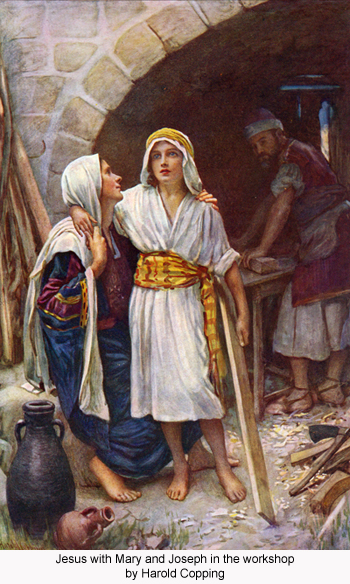 Jesus Discerns His Destiny (Age 13)
Jesus Discerns His Destiny (Age 13)
124:5.1 In this year the lad of Nazareth passed from boyhood to the beginning of young manhood; his voice began to change, and other features of mind and body gave evidence of the oncoming status of manhood.
124:5.3 It was about the middle of February that Jesus became humanly assured that he was destined to perform a mission on earth for the enlightenment of man and the revelation of God. Momentous decisions, coupled with far-reaching plans, were formulating in the mind of this youth, who was, to outward appearances, an average Jewish lad of Nazareth. The intelligent life of all Nebadon looked on with fascination and amazement as all this began to unfold in the thinking and acting of the now adolescent carpenter's son.
124:6.15 On the day before the Passover Sabbath, flood tides of spiritual illumination swept through the mortal mind of Jesus and filled his human heart to overflowing with affectionate pity for the spiritually blind and morally ignorant multitudes assembled for the celebration of the ancient Passover commemoration. This was one of the most extraordinary days that the Son of God spent in the flesh; and during the night, for the first time in his earth career, there appeared to him an assigned messenger from Salvington, commissioned by Immanuel, who said: "The hour has come. It is time that you began to be about your Father's business."
124:6.16 And so, even ere the heavy responsibilities of the Nazareth family descended upon his youthful shoulders, there now arrived the celestial messenger to remind this lad, not quite thirteen years of age, that the hour had come to begin the resumption of the responsibilities of a universe. This was the first act of a long succession of events which finally culminated in the completion of the Son's bestowal on Urantia and the replacing of "the government of a universe on his human-divine shoulders."
124:6.17 As time passed, the mystery of the incarnation became, to all of us, more and more unfathomable. We could hardly comprehend that this lad of Nazareth was the creator of all Nebadon. Neither do we nowadays understand how the spirit of this same Creator Son and the spirit of his Paradise Father are associated with the souls of mankind. With the passing of time, we could see that his human mind was increasingly discerning that, while he lived his life in the flesh, in spirit on his shoulders rested the responsibility of a universe.
124:6.18 Thus ends the career of the Nazareth lad, and begins the narrative of that adolescent youth— the increasingly self-conscious divine human—who now begins the contemplation of his world career as he strives to integrate his expanding life purpose with the desires of his parents and his obligations to his family and the society of his day and age.
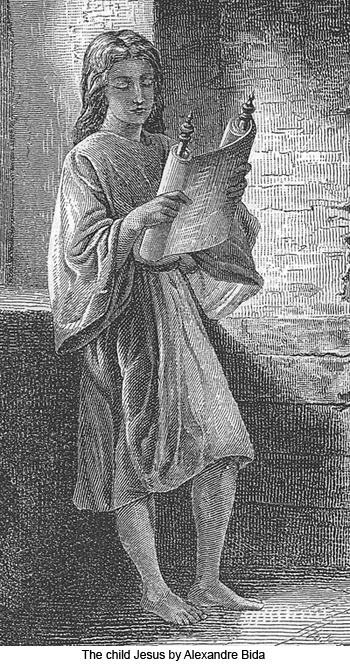 Jesus Graduates From Synagogue (Age 13)
Jesus Graduates From Synagogue (Age 13)
124:5.4 On the first day of the week, March 20, A.D. 7, Jesus graduated from the course of training in the local school connected with the Nazareth synagogue. This was a great day in the life of any ambitious Jewish family, the day when the first-born son was pronounced a "son of the commandment" and the ransomed first-born of the Lord God of Israel, a "child of the Most High" and servant of the Lord of all the earth.
124:5.5 Friday of the week before, Joseph had come over from Sepphorism where he was in charge of the work on a new public building, to be present on this glad occasion. Jesus' teacher confidently believed that his alert and diligent pupil was destined to some outstanding career, some distinguished mission. The elders, notwithstanding all their trouble with Jesus' nonconformist tendencies, were very proud of the lad and had already begun laying plans which would enable him to go to Jerusalem to continue his education in the renowned Hebrew academies.
124:5.6 As Jesus heard these plans discussed from time to time, he became increasingly sure that he would never go to Jerusalem to study with the rabbis. But he little dreamed of the tragedy, so soon to occur, which would insure the abandonment of all such plans by causing him to assume the responsibility for the support and direction of a large family, presently to consist of five brothers and three sisters as well as his mother and himself.
The Journey To Jerusalem - Jesus Meets Mary, Martha And Lazarus
124:6.1 Jesus, having now reached the threshold of young manhood and having been formally graduated from the synagogue schools, was qualified to proceed to Jerusalem with his parents to participate with them in the celebration of his first Passover. The Passover feast of this year fell on Saturday, April 9, A.D. 7. A considerable company (103) made ready to depart from Nazareth early Monday morning, April 4, for Jerusalem. They journeyed south toward Samaria, but on reaching Jezreel, they turned east, going around Mount Gilboa into the Jordan valley in order to avoid passing through Samaria. Joseph and his family would have enjoyed going down through Samaria by way of Jacob's Well and Bethel, but since the Jews disliked to deal with the Samaritans, they decided to go with their neighbors by way of the Jordan valley.
 124:6.2 The much-dreaded Archelaus had been deposed, and they had little to fear in taking Jesus to Jerusalem. Twelve years had passed since the first Herod had sought to destroy the babe of Bethlehem, and no one would now think of associating that affair with this obscure lad of Nazareth.
124:6.2 The much-dreaded Archelaus had been deposed, and they had little to fear in taking Jesus to Jerusalem. Twelve years had passed since the first Herod had sought to destroy the babe of Bethlehem, and no one would now think of associating that affair with this obscure lad of Nazareth.
124:6.3 Before reaching the Jezreel junction, and as they journeyed on, very soon, on the left, they passed the ancient village of Shunem, and Jesus heard again about the most beautiful maiden of all Israel who once lived there and also about the wonderful works Elisha performed there. In passing by Jezreel, Jesus' parents recounted the doings of Ahab and Jezebel and the exploits of Jehu. In passing around Mount Gilboa, they talked much about Saul, who took his life on the slopes of this mountain, King David, and the associations of this historic spot.
124:6.4 As they rounded the base of Gilboa, the pilgrims could see the Greek city of Scythopolis on the right. They gazed upon the marble structures from a distance but went not near the gentile city lest they so defile themselves that they could not participate in the forthcoming solemn and sacred ceremonies of the Passover at Jerusalem. Mary could not understand why neither Joseph nor Jesus would speak of Scythopolis. She did not know about their controversy of the previous year as they had never revealed this episode to her.
124:6.5 The road now led immediately down into the tropical Jordan valley, and soon Jesus was to have exposed to his wondering gaze the crooked and ever-winding Jordan with its glistening and rippling waters as it flowed down toward the Dead Sea. They laid aside their outer garments as they journeyed south in this tropical valley, enjoying the luxurious fields of grain and the beautiful oleanders laden with their pink blossoms, while massive snow-capped Mount Hermon stood far to the north, in majesty looking down on the historic valley. A little over three hours' travel from opposite Scythopolis they came upon a bubbling spring, and here they camped for the night, out under the starlit heavens.
124:6.6 On their second day's journey they passed by where the Jabbok, from the east, flows into the Jordan, and looking east up this river valley, they recounted the days of Gideon, when the Midianites poured into this region to overrun the land. Toward the end of the second day's journey they camped near the base of the highest mountain overlooking the Jordan valley, Mount Sartaba, whose summit was occupied by the Alexandrian fortress where Herod had imprisoned one of his wives and buried his two strangled sons
124:6.7 The third day they passed by two villages which had been recently built by Herod and noted their superior architecture and their beautiful palm gardens. By nightfall they reached Jericho, where they remained until the morrow. That evening Joseph, Mary, and Jesus walked a mile and a half to the site of the ancient Jericho, where Joshua, for whom Jesus was named, had performed his renowned exploits, according to Jewish tradition.
124:6.8 By the fourth and last day's journey the road was a continuous procession of pilgrims. They now began to climb the hills leading up to Jerusalem. As they neared the top, they could look across the Jordan to the mountains beyond and south over the sluggish waters of the Dead Sea. About halfway up to Jerusalem, Jesus gained his first view of the Mount of Olives (the region to be so much a part of his subsequent life), and Joseph pointed out to him that the Holy City lay just beyond this ridge, and the lad's heart beat fast with joyous anticipation of soon beholding the city and house of his heavenly Father.
124:6.9 On the eastern slopes of Olivet they paused for rest in the borders of a little village called Bethany. The hospitable villagers poured forth to minister to the pilgrims, and it happened that Joseph and his family had stopped near the house of one Simon, who had three children about the same age as Jesus—Mary, Martha, and Lazarus. They invited the Nazareth family in for refreshment, and a lifelong friendship sprang up between the two families. Many times afterward, in his eventful life, Jesus stopped in this home.
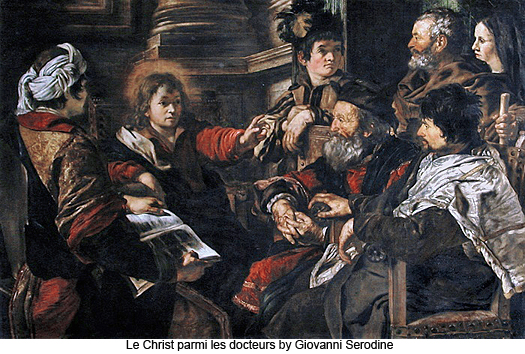 Jesus At Jerusalem - Questioning Authority
Jesus At Jerusalem - Questioning Authority
NO INCIDENT IN all Jesus' eventful earth career was more engaging, more humanly thrilling, than this, his first remembered visit to Jerusalem. He was especially stimulated by the experience of attending the temple discussions by himself, and it long stood out in his memory as the great event of his later childhood and early youth. This was his first opportunity to enjoy a few days of independent living, the exhilaration of going and coming without restraint and restrictions. This brief period of undirected living, during the week following the Passover, was the first complete freedom from responsibility he had ever enjoyed. And it was many years subsequent to this before he again had a like period of freedom from all sense of responsibility, even for a short time.
125:0.2 Women seldom went to the Passover feast at Jerusalem; they were not required to be present. Jesus, however, virtually refused to go unless his mother would accompany them. And when his mother decided to go, many other Nazareth women were led to make the journey, so that the Passover company contained the largest number of women, in proportion to men, ever to go up to the Passover from Nazareth. Ever and anon, on the way to Jerusalem, they chanted the one hundred and thirtieth Psalm.
125:0.3 From the time they left Nazareth until they reached the summit of the Mount of Olives, Jesus experienced one long stress of expectant anticipation. All through a joyful childhood he had reverently heard of Jerusalem and its temple; now he was soon to behold them in reality. From the Mount of Olives and from the outside, on closer inspection, the temple had been all and more than Jesus had expected; but when he once entered its sacred portals, the great disillusionment began.
125:0.4 In company with his parents Jesus passed through the temple precincts on his way to join that group of new sons of the law who were about to be consecrated as citizens of Israel. He was a little disappointed by the general demeanor of the temple throngs, but the first great shock of the day came when his mother took leave of them on her way to the women's gallery. It had never occurred to Jesus that his mother was not to accompany him to the consecration ceremonies, and he was thoroughly indignant that she was made to suffer from such unjust discrimination. While he strongly resented this, aside from a few remarks of protest to his father, he said nothing. But he thought, and thought deeply, as his questions to the scribes and teachers a week later disclosed.
125:0.5 He passed through the consecration rituals but was disappointed by their perfunctory and routine natures. He missed that personal interest which characterized the ceremonies of the synagogue at Nazareth. He then returned to greet his mother and prepared to accompany his father on his first trip about the temple and its various courts, galleries, and corridors. The temple precincts could accommodate over two hundred thousand worshipers at one time, and while the vastness of these buildings—in comparison with any he had ever seen—greatly impressed his mind, he was more intrigued by the contemplation of the spiritual significance of the temple ceremonies and their associated worship.
125:0.6 Though many of the temple rituals very touchingly impressed his sense of the beautiful and the symbolic, he was always disappointed by the explanation of the real meanings of these ceremonies which his parents would offer in answer to his many searching inquiries. Jesus simply would not accept explanations of worship and religious devotion which involved belief in the wrath of God or the anger of the Almighty. In further discussion of these questions, after the conclusion of the temple visit, when his father became mildly insistent that he acknowledge acceptance of the orthodox Jewish beliefs, Jesus turned suddenly upon his parents and, looking appealingly into the eyes of his father, said: "My father, it cannot be true—the Father in heaven cannot so regard his erring children on earth. The heavenly Father cannot love his children less than you love me. And I well know, no matter what unwise thing I might do, you would never pour out wrath upon me nor vent anger against me. If you, my earthly father, possess such human reflections of the Divine, how much more must the heavenly Father be filled with goodness and overflowing with mercy. I refuse to believe that my Father in heaven loves me less than my father on earth."
125:0.7 When Joseph and Mary heard these words of their first-born son, they held their peace. And never again did they seek to change his mind about the love of God and the mercifulness of the Father in heaven.
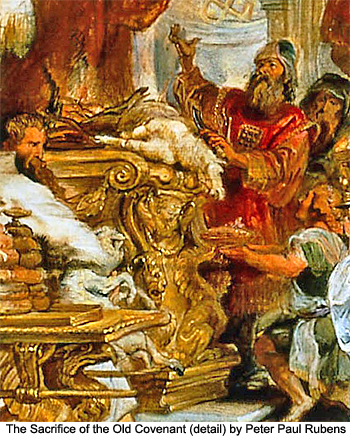 Jesus Views The Temple
Jesus Views The Temple
125:1.1 Everywhere Jesus went throughout the temple courts, he was shocked and sickened by the spirit of irreverence which he observed. He deemed the conduct of the temple throngs to be inconsistent with their presence in "his Father's house." But he received the shock of his young life when his father escorted him into the court of the gentiles with its noisy jargon, loud talking and cursing, mingled indiscriminately with the bleating of sheep and the babble of noises which betrayed the presence of the money-changers and the vendors of sacrificial animals and sundry other commercial commodities.
125:1.2 But most of all was his sense of propriety outraged by the sight of the frivolous courtesans parading about within this precinct of the temple, just such painted women as he had so recently seen when on a visit to Sepphoris. This profanation of the temple fully aroused all his youthful indignation, and he did not hesitate to express himself freely to Joseph.
125:1.3 Jesus admired the sentiment and service of the temple, but he was shocked by the spiritual ugliness which he beheld on the faces of so many of the unthinking worshipers.
125:1.4 They now passed down to the priests' court beneath the rock ledge in front of the temple, where the altar stood, to observe the killing of the droves of animals and the washing away of the blood from the hands of the officiating slaughter priests at the bronze fountain. The bloodstained pavement, the gory hands of the priests, and the sounds of the dying animals were more than this nature- loving lad could stand. The terrible sight sickened this boy of Nazareth; he clutched his father's arm and begged to be taken away. They walked back through the court of the gentiles, and even the coarse laughter and profane jesting which he there heard were a relief from the sights he had just beheld.
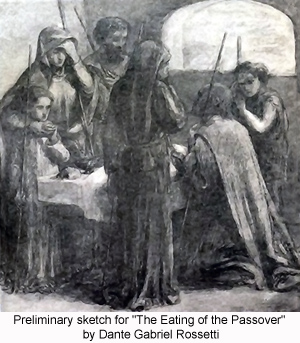 125:1.5 Joseph saw how his son had sickened at the sight of the temple rites and wisely led him around to view the "gate beautiful," the artistic gate made of Corinthian bronze. But Jesus had had enough for his first visit at the temple. They returned to the upper court for Mary and walked about in the open air and away from the crowds for an hour, viewing the Asmonean palace, the stately home of Herod, and the tower of the Roman guards. During this stroll Joseph explained to Jesus that only the inhabitants of Jerusalem were permitted to witness the daily sacrifices in the temple, and that the dwellers in Galilee came up only three times a year to participate in the temple worship: at the Passover, at the feast of Pentecost (seven weeks after Passover), and at the feast of tabernacles in October. These feasts were established by Moses. They then discussed the two later established feasts of the dedication and of Purim. Afterward they went to their lodgings and made ready for the celebration of the Passover.
125:1.5 Joseph saw how his son had sickened at the sight of the temple rites and wisely led him around to view the "gate beautiful," the artistic gate made of Corinthian bronze. But Jesus had had enough for his first visit at the temple. They returned to the upper court for Mary and walked about in the open air and away from the crowds for an hour, viewing the Asmonean palace, the stately home of Herod, and the tower of the Roman guards. During this stroll Joseph explained to Jesus that only the inhabitants of Jerusalem were permitted to witness the daily sacrifices in the temple, and that the dwellers in Galilee came up only three times a year to participate in the temple worship: at the Passover, at the feast of Pentecost (seven weeks after Passover), and at the feast of tabernacles in October. These feasts were established by Moses. They then discussed the two later established feasts of the dedication and of Purim. Afterward they went to their lodgings and made ready for the celebration of the Passover.
Jesus' First Passover
125:2.1 Five Nazareth families were guests of, or associates with, the family of Simon of Bethany in the celebration of the Passover, Simon having purchased the paschal lamb for the company. It was the slaughter of these lambs in such enormous numbers that had so affected Jesus on his temple visit. It had been the plan to eat the Passover with Mary's relatives, but Jesus persuaded his parents to accept the invitation to go to Bethany.
125:2.2 That night they assembled for the Passover rites, eating the roasted flesh with unleavened bread and bitter herbs. Jesus, being a new son of the covenant, was asked to recount the origin of the Passover, and this he well did, but he somewhat disconcerted his parents by the inclusion of numerous remarks mildly reflecting the impressions made on his youthful but thoughtful mind by the things which he had so recently seen and heard. This was the beginning of the seven-day ceremonies of the feast of the Passover.
125:2.3 Even at this early date, though he said nothing about such matters to his parents, Jesus had begun to turn over in his mind the propriety of celebrating the Passover without the slaughtered lamb. He felt assured in his own mind that the Father in heaven was not pleased with this spectacle of sacrificial offerings, and as the years passed, he became increasingly determined someday to establish the celebration of a bloodless Passover.
125:2.4 Jesus slept very little that night. His rest was greatly disturbed by revolting dreams of slaughter and suffering. His mind was distraught and his heart torn by the inconsistencies and absurdities of the theology of the whole Jewish ceremonial system. His parents likewise slept little. They were greatly disconcerted by the events of the day just ended. They were completely upset in their own hearts by the lad's, to them, strange and determined attitude. Mary became nervously agitated during the fore part of the night, but Joseph remained calm, though he was equally puzzled. Both of them feared to talk frankly with the lad about these problems, though Jesus would gladly have talked with his parents if they had dared to encourage him.
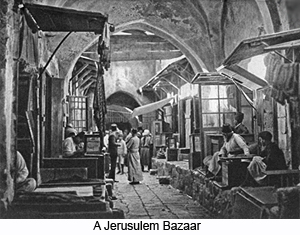 125:2.5 The next day's services at the temple were more acceptable to Jesus and did much to relieve the unpleasant memories of the previous day. The following morning young Lazarus took Jesus in hand, and they began a systematic exploration of Jerusalem and its environs. Before the day was over, Jesus discovered the various places about the temple where teaching and question conferences were in progress; and aside from a few visits to the holy of holies to gaze in wonder as to what really was behind the veil of separation, he spent most of his time about the temple at these teaching conferences.
125:2.5 The next day's services at the temple were more acceptable to Jesus and did much to relieve the unpleasant memories of the previous day. The following morning young Lazarus took Jesus in hand, and they began a systematic exploration of Jerusalem and its environs. Before the day was over, Jesus discovered the various places about the temple where teaching and question conferences were in progress; and aside from a few visits to the holy of holies to gaze in wonder as to what really was behind the veil of separation, he spent most of his time about the temple at these teaching conferences.
125:2.6 Throughout the Passover week, Jesus kept his place among the new sons of the commandment, and this meant that he must seat himself outside the rail which segregated all persons who were not full citizens of Israel. Being thus made conscious of his youth, he refrained from asking the many questions which surged back and forth in his mind; at least he refrained until the Passover celebration had ended and these restrictions on the newly consecrated youths were lifted.
125:2.7 On Wednesday of the Passover week, Jesus was permitted to go home with Lazarus to spend the night at Bethany. This evening, Lazarus, Martha, and Mary heard Jesus discuss things temporal and eternal, human and divine, and from that night on they all three loved him as if he had been their own brother.
125:2.8 By the end of the week, Jesus saw less of Lazarus since he was not eligible for admission to even the outer circle of the temple discussions, though he attended some of the public talks delivered in the outer courts. Lazarus was the same age as Jesus, but in Jerusalem youths were seldom admitted to the consecration of sons of the law until they were a full thirteen years of age.
125:2.9 Again and again, during the Passover week, his parents would find Jesus sitting off by himself with his youthful head in his hands, profoundly thinking. They had never seen him behave like this, and not knowing how much he was confused in mind and trouble d in spirit by the experience through which he was passing, they were sorely perplexed; they did not know what to do. They welcomed the passing of the days of the Passover week and longed to have their strangely acting son safely back in Nazareth.
125:2.10 Day by day Jesus was thinking through his problems. By the end of the week he had made many adjustments; but when the time came to return to Nazareth, his youthful mind was still swarming with perplexities and beset by a host of unanswered questions and unsolved problems.
125:2.11 Before Joseph and Mary left Jerusalem, in company with Jesus' Nazareth teacher they made definite arrangements for Jesus to return when he reached the age of fifteen to begin his long course of study in one of the best-known academies of the rabbis. Jesus accompanied his parents and teacher on their visits to the school, but they were all distressed to observe how indifferent he seemed to all they said and did. Mary was deeply pained at his reactions to the Jerusalem visit, and Joseph was profoundly perplexed at the lad's strange remarks and unusual conduct.
125:2.12 After all, Passover week had been a great event in Jesus' life. He had enjoyed the opportunity of meeting scores of boys about his own age, fellow candidates for the consecration, and he utilized such contacts as a means of learning how people lived in Mesopotamia, Turkestan, and Parthia, as well as in the Far-Western provinces of Rome. He was already fairly conversant with the way in which the youth of Egypt and other regions near Palestine grew up. There were thousands of young people in Jerusalem at this time, and the Nazareth lad personally met, and more or less extensively interviewed, more than one hundred and fifty. He was particularly interested in those who hailed from the Far-Eastern and the remote Western countries. As a result of these contact s the lad began to entertain a desire to travel about the world for the purpose of learning how the various groups of his fellow men toiled for their livelihood.
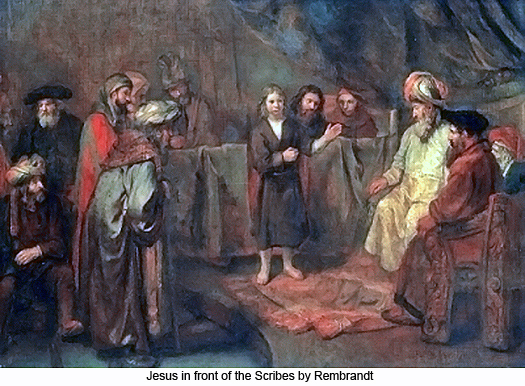 Jesus Gets Left Behind
Jesus Gets Left Behind
125:3.1 It had been arranged that the Nazareth party should gather in the region of the temple at midforenoon on the first day of the week after the Passover festival had ended. This they did and started out on the return journey to Nazareth. Jesus had gone into the temple to listen to the discussions while his parents awaited the assembly of their fellow travelers. Presently the company prepared to depart, the men going in one group and the women in another as was their custom in journeying to and from the Jerusalem festivals. Jesus had gone up to Jerusalem in company with his mother and the women. Being now a young man of the consecration, he was supposed to journey back to Nazareth in company with his father and the men. But as the Nazareth party moved on toward Bethany, Jesus was completely absorbed in the discussion of angels, in the temple, being wholly unmindful of the passing of the time for the departure of his parents. And he did not realize that he had been left behind until the noontime adjournment of the temple conferences.
125:3.2 The Nazareth travelers did not miss Jesus because Mary surmised he journeyed with the men, while Joseph thought he traveled with the women since he had gone up to Jerusalem with the women, leading Mary's donkey. They did not discover his absence until they reached Jericho and prepared to tarry for the night. After making inquiry of the last of the party to reach Jericho and learning that none of them had seen their son, they spent a sleepless night, turning over in their minds what might have happened to him, recounting many of his unusual reactions to the events of Passover week, and mildly chiding each other for not seeing to it that he was in the group before they left Jerusalem.
Jesus' First And Second Days In The Temple
125:4.1 In the meantime, Jesus had remained in the temple throughout the afternoon, listening to the discussions and enjoying the more quiet and decorous atmosphere, the great crowds of Passover week having about disappeared. At the conclusion of the afternoon discussions, in none of which Jesus participated, he betook himself to Bethany, arriving just as Simon's family made ready to partake of their evening meal. The three youngsters were overjoyed to greet Jesus, and he remained in Simon's house for the night. He visited very little during the evening, spending much of the time alone in the garden meditating.
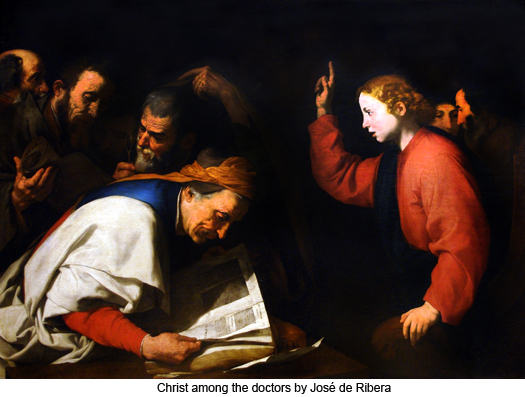 125:4.2 Early next day Jesus was up and on his way to the temple. On the brow of Olivet he paused and wept over the sight his eyes beheld—a spiritually impoverished people, tradition bound and living under the surveillance of the Roman legions. Early forenoon found him in the temple with his mind made up to take part in the discussions. Meanwhile, Joseph and Mary also had arisen with the early dawn with the intention of retracing their steps to Jerusalem. First, they hastened to the house of their relatives, where they had lodged as a family during the Passover week, but inquiry elicited the fact that no one had seen Jesus. After searching all day and finding no trace of him, they returned to their relatives for the night.
125:4.2 Early next day Jesus was up and on his way to the temple. On the brow of Olivet he paused and wept over the sight his eyes beheld—a spiritually impoverished people, tradition bound and living under the surveillance of the Roman legions. Early forenoon found him in the temple with his mind made up to take part in the discussions. Meanwhile, Joseph and Mary also had arisen with the early dawn with the intention of retracing their steps to Jerusalem. First, they hastened to the house of their relatives, where they had lodged as a family during the Passover week, but inquiry elicited the fact that no one had seen Jesus. After searching all day and finding no trace of him, they returned to their relatives for the night.
125:4.3 At the second conference Jesus had made bold to ask questions, and in a very amazing way he participated in the temple discussions but always in a manner consistent with his youth. Sometimes his pointed questions were somewhat embarrassing to the learned teachers of the Jewish law, but he evinced such a spirit of candid fairness, coupled with an evident hunger for knowledge, that the majority of the temple teachers were disposed to treat him with every consideration. But when he presumed to question the justice of putting to death a drunken gentile who had wandered outside the court of the gentiles and unwittingly entered the forbidden and reputedly sacred precincts of the temple, one of the more intolerant teachers grew impatient with the lad's implied criticisms and, glowering down upon him, asked how old he was. Jesus replied, "thirteen years lacking a trifle more than four months." "Then," rejoined the now irate teacher, "why are you here, since you are not of age as a son of the law?" And when Jesus explained that he had received consecration during the Passover, and that he was a finished student of the Nazareth schools, the teachers with one accord derisively replied, "We might have known; he is from Nazareth." But the leader insisted that Jesus was not to be blamed if the rulers of the synagogue at Nazareth had graduated him, technically, when he was twelve instead of thirteen; and notwithstanding that several of his detractors got up and left, it was ruled that the lad might continue undisturbed as a pupil of the temple discussions.
125:4.4 When this, his second day in the temple, was finished, again he went to Bethany for the night. And again he went out in the garden to meditate and pray. It was apparent that his mind was concerned with the contemplation of weighty problems.
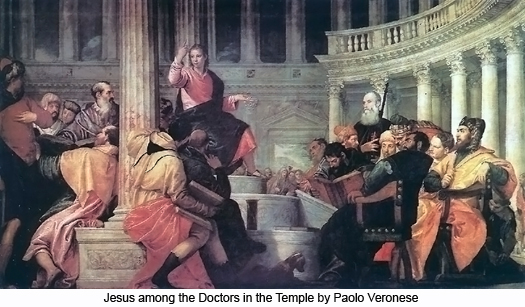 Jesus' Third Day In The Temple
Jesus' Third Day In The Temple
125:5.1 Jesus' third day with the scribes and teachers in the temple witnessed the gathering of many spectators who, having heard of this youth from Galilee, came to enjoy the experience of seeing a lad confuse the wise men of the law. Simon also came down from Bethany to see what the boy was up to. Throughout this day Joseph and Mary continued their anxious search for Jesus, even going several times into the temple but never thinking to scrutinize the several discussion groups, although they once came almost within hearing distance of his fascinating voice.
125:5.2 Before the day had ended, the entire attention of the chief discussion group of the temple had become focused upon the questions being asked by Jesus. Among his many questions were:
- 125:5.3 1. What really exists in the holy of holies, behind the veil?
- 125:5.4 2. Why should mothers in Israel be segregated from the male temple worshipers?
- 125:5.5 3. If God is a father who loves his children, why all this slaughter of animals to gain divine favor—has the teaching of Moses been misunderstood?
- 125:5.6 4. Since the temple is dedicated to the worship of the Father in heaven, is it consistent to permit the presence of those who engage in secular barter and trade?
- 125:5.7 5. Is the expected Messiah to become a temporal prince to sit on the throne of David, or is he to function as the light of life in the establishment of a spiritual kingdom?
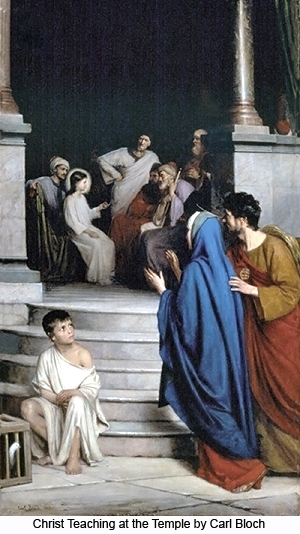 125:5.8 And all the day through, those who listened marveled at these questions, and none was more astonished than Simon. For more than four hours this Nazareth youth plied these Jewish teachers with thought-provoking and heart- searching questions. He made few comments on the remarks of his elders. He conveyed his teaching by the questions he would ask. By the deft and subtle phrasing of a question he would at one and the same time challenge their teaching and suggest his own. In the manner of his asking a question there was an appealing combination of sagacity and humor which endeared him even to those who more or less resented his youthfulness. He was always eminently fair and considerate in the asking of these penetrating questions. On this eventful afternoon in the temple he exhibited that same reluctance to take unfair advantage of an opponent which characterized his entire subsequent public ministry. As a youth, and later on as a man, he seemed to be utterly free from all egoistic desire to win an argument merely to experience logical triumph over his fellows, being interested supremely in just one thing: to proclaim everlasting truth and thus effect a fuller revelation of the eternal God.
125:5.8 And all the day through, those who listened marveled at these questions, and none was more astonished than Simon. For more than four hours this Nazareth youth plied these Jewish teachers with thought-provoking and heart- searching questions. He made few comments on the remarks of his elders. He conveyed his teaching by the questions he would ask. By the deft and subtle phrasing of a question he would at one and the same time challenge their teaching and suggest his own. In the manner of his asking a question there was an appealing combination of sagacity and humor which endeared him even to those who more or less resented his youthfulness. He was always eminently fair and considerate in the asking of these penetrating questions. On this eventful afternoon in the temple he exhibited that same reluctance to take unfair advantage of an opponent which characterized his entire subsequent public ministry. As a youth, and later on as a man, he seemed to be utterly free from all egoistic desire to win an argument merely to experience logical triumph over his fellows, being interested supremely in just one thing: to proclaim everlasting truth and thus effect a fuller revelation of the eternal God.
125:5.8 When the day was over, Simon and Jesus wended their way back to Bethany. For most of the distance both the man and the boy were silent. Again Jesus paused on the brow of Olivet, but as he viewed the city and its temple, he did not weep; he only bowed his head in silent devotion.
125:5.10 After the evening meal at Bethany he again declined to join the merry circle but instead went to the garden, where he lingered long into the night, vainly endeavoring to think out some definite plan of approach to the problem of his lifework and to decide how best he might labor to reveal to his spiritually blinded countrymen a more beautiful concept of the heavenly Father and so set them free from their terrible bondage to law, ritual, ceremonial, and musty tradition. But the clear light did not come to the truth-seeking lad
Mary And Joseph Find Jesus In The Temple
125:6.1 Jesus was strangely unmindful of his earthly parents; even at breakfast, when Lazarus's mother remarked that his parents must be about home by that time, Jesus did not seem to comprehend that they would be somewhat worried about his having lingered behind.
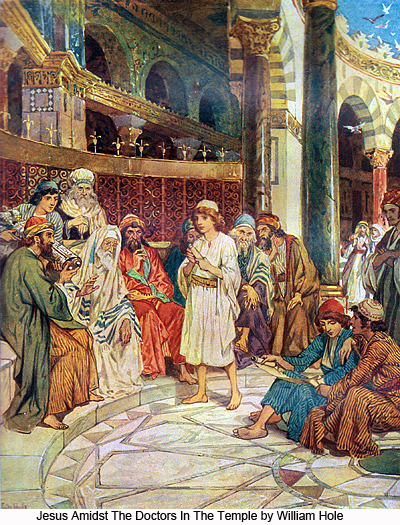 125:6.2 Again he journeyed to the temple, but he did not pause to meditate at the brow of Olivet. In the course of the morning's discussions much time was devoted to the law and the prophets, and the teachers were astonished that Jesus was so familiar with the Scriptures, in Hebrew as well as Greek. But they were amazed not so much by his knowledge of truth as by his youth.
125:6.2 Again he journeyed to the temple, but he did not pause to meditate at the brow of Olivet. In the course of the morning's discussions much time was devoted to the law and the prophets, and the teachers were astonished that Jesus was so familiar with the Scriptures, in Hebrew as well as Greek. But they were amazed not so much by his knowledge of truth as by his youth.
125:6.3 At the afternoon conference they had hardly begun to answer his question relating to the purpose of prayer when the leader invited the lad to come forward and, sitting beside him, bade him state his own views regarding prayer and worship.
125:6.4 The evening before, Jesus' parents had heard about this strange youth who so deftly sparred with the expounders of the law, but it had not occurred to them that this lad was their son. They had about decided to journey out to the home of Zacharias as they thought Jesus might have gone thither to see Elizabeth and John. Thinking Zacharias might perhaps be at the temple, they stopped there on their way to the City of Judah. As they strolled through the courts of the temple, imagine their surprise and amazement when they recognized the voice of the missing lad and beheld him seated among the temple teachers.
125:6.5 Joseph was speechless, but Mary gave vent to her long-pent-up fear and anxiety when, rushing up to the lad, now standing to greet his astonished parents, she said: "My child, why have you treated us like this? It is now more than three days that your father and I have searched for you sorrowing. Whatever possessed you to desert us?" It was a tense moment. All eyes were turned on Jesus to hear what he would say. His father looked reprovingly at him but said nothing.
125:6.6 It should be remembered that Jesus was supposed to be a young man. He had finished the regular schooling of a child, had been recognized as a son of the law, and had received consecration as a citizen of Israel. And yet his mother more than mildly upbraided him before all the people assembled, right in the midst of the most serious and sublime effort of his young life, thus bringing to an inglorious termination one of the greatest opportunities ever to be granted him to function as a teacher of truth, a preacher of righteousness, a revealer of the loving character of his Father in heaven.
125:6.7 But the lad was equal to the occasion. When you take into fair consideration all the factors which combined to make up this situation, you will be better prepared to fathom the wisdom of the boy's reply to his mother's unintended rebuke. After a moment's thought, Jesus answered his mother, saying:"Why is it that you have so long sought me? Would you not expect to find me in my Father's house since the time has come when I should be about my Father's business?"
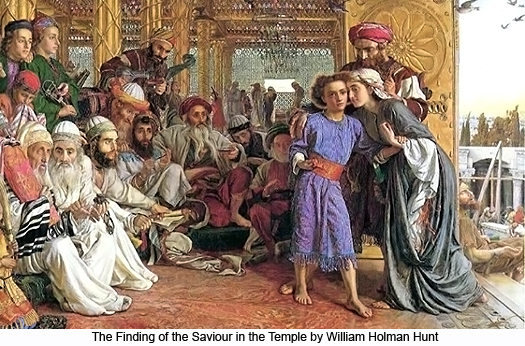 125:6.8 Everyone was astonished at the lad's manner of speaking. Silently they all withdrew and left him standing alone with his parents. Presently the young man relieved the embarrassment of all three when he quietly said: "Come, my parents, none has done aught but that which he thought best. Our Father in heaven has ordained these things; let us depart for home."
125:6.8 Everyone was astonished at the lad's manner of speaking. Silently they all withdrew and left him standing alone with his parents. Presently the young man relieved the embarrassment of all three when he quietly said: "Come, my parents, none has done aught but that which he thought best. Our Father in heaven has ordained these things; let us depart for home."
125:6.9 In silence they started out, arriving at Jericho for the night. Only once did they pause, and that on the brow of Olivet, when the lad raised his staff aloft and, quivering from head to foot under the surging of intense emotion, said: "O Jerusalem, Jerusalem, and the people thereof, what slaves you are—subservient to the Roman yoke and victims of your own traditions—but I will return to cleanse yonder temple and deliver my people from this bondage!"
125:6.10 On the three days' journey to Nazareth Jesus said little; neither did his parents say much in his presence. They were truly at a loss to understand the conduct of their first-born son, but they did treasure in their hearts his sayings, even though they could not fully comprehend their meanings.
125:6.11 Upon reaching home, Jesus made a brief statement to his parents, assuring them of his affection and implying that they need not fear he would again give any occasion for their suffering anxiety because of his conduct. He concluded this momentous statement by saying: "While I must do the will of my Father in heaven, I will also be obedient to my father on earth. I will await my hour."
125:6.12 Though Jesus, in his mind, would many times refuse to consent to the well-intentioned but misguided efforts of his parents to dictate the course of his thinking or to establish the plan of his work on earth, still, in every manner consistent with his dedication to the doing of his Paradise Father's will, he did most gracefully conform to the desires of his earthly father and to the usages of his family in the flesh. Even when he could not consent, he would do everything possible to conform. He was an artist in the matter of adjusting his dedication to duty to his obligations of family loyalty and social service.
125:6.13 Joseph was puzzled, but Mary, as she reflected on these experiences, gained comfort, eventually viewing his utterance on Olivet as prophetic of the Messianic mission of her son as Israel's deliverer. She set to work with renewed energy to mold his thoughts into patriotic and nationalistic channels and enlisted the efforts of her brother, Jesus' favorite uncle; and in every other way did the mother of Jesus address herself to the task of preparing her first-born son to assume the leadership of those who would restore the throne of David and forever cast off the gentile yoke of political bondage.
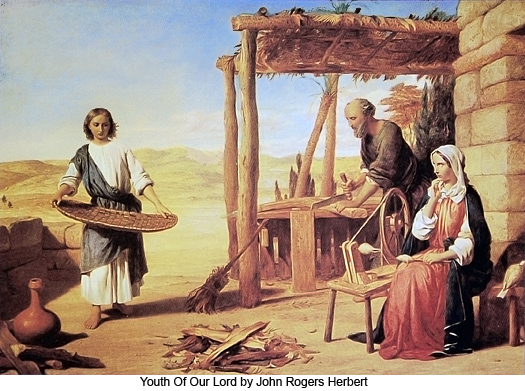 The Calm Before The Storm
The Calm Before The Storm
126:1.1 This is the calendar year of his fourteenth birthday. He had become a good yoke maker and worked well with both canvas and leather. He was also rapidly developing into an expert carpenter and cabinetmaker. This summer he made frequent trips to the top of the hill to the northwest of Nazareth for prayer and meditation. He was gradually becoming more self-conscious of the nature of his bestowal on earth.
126:1.2 This hill, a little more than one hundred years previously, had been the "high place of Baal," and now it was the site of the tomb of Simeon, a reputed holy man of Israel. From the summit of this hill of Simeon, Jesus looked out over Nazareth and the surrounding country. He would gaze upon Megiddo and recall the story of the Egyptian army winning its first great victory in Asia, and how, later on, another such army defeated the Judean king Josiah. Not far away he could look upon Taanach, where Deborah and Barak defeated Sisera. In the distance he could view the hills of Dothan, where he had been taught Joseph's brethren sold him into Egyptian slavery. He then would shift his gaze over to Ebal and Gerizim and recount to himself the traditions of Abraham, Jacob, and Abimelech. And thus he recalled and turned over in his mind the historic and traditional events of his father Joseph's people.
126:1.3 He continued to carry on his advanced courses of reading under the synagogue teachers, and he also continued with the home education of his brothers and sisters as they grew up to suitable ages.
126:1.4 Early this year Joseph arranged to set aside the income from his Nazareth and Capernaum property to pay for Jesus' long course of study at Jerusalem, it having been planned that he should go to Jerusalem in August of the following year when he would be fifteen years of age.
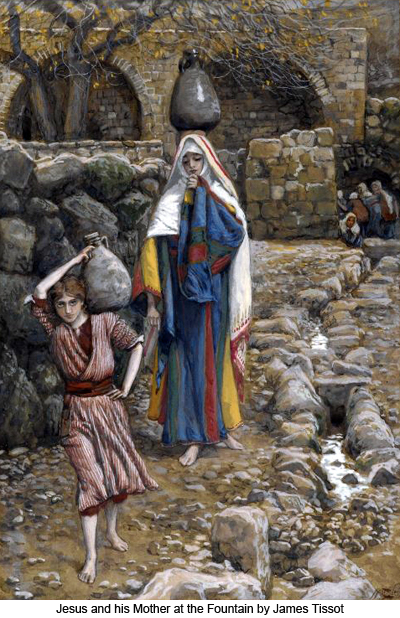 126:1.5 By the beginning of this year both Joseph and Mary entertained frequent doubts about the destiny of their first-born son. He was indeed a brilliant and lovable child, but he was so difficult to understand, so hard to fathom, and again, nothing extraordinary or miraculous ever happened. Scores of times had his proud mother stood in breathless anticipation, expecting to see her son engage in some superhuman or miraculous performance, but always were her hopes dashed down in cruel disappointment. And all this was discouraging, even disheartening. The devout people of those days truly believed that prophets and men of promise always demonstrated their calling and established their divine authority by performing miracles and working wonders. But Jesus did none of these things; wherefore was the confusion of his parents steadily increased as they contemplated his future.
126:1.5 By the beginning of this year both Joseph and Mary entertained frequent doubts about the destiny of their first-born son. He was indeed a brilliant and lovable child, but he was so difficult to understand, so hard to fathom, and again, nothing extraordinary or miraculous ever happened. Scores of times had his proud mother stood in breathless anticipation, expecting to see her son engage in some superhuman or miraculous performance, but always were her hopes dashed down in cruel disappointment. And all this was discouraging, even disheartening. The devout people of those days truly believed that prophets and men of promise always demonstrated their calling and established their divine authority by performing miracles and working wonders. But Jesus did none of these things; wherefore was the confusion of his parents steadily increased as they contemplated his future.
126:1.6 The improved economic condition of the Nazareth family was reflected in many ways about the home and especially in the increased number of smooth white boards which were used as writing slates, the writing being done with charcoal. Jesus was also permitted to resume his music lessons; he was very fond of playing the harp.
126:1.7 Throughout this year it can truly be said that Jesus "grew in favor with man and with God." The prospects of the family seemed good; the future was bright.
The Death Of Joseph (Age 14)
126:2.1 All did go well until that fateful day of Tuesday, September 25, when a runner from Sepphoris brought to this Nazareth home the tragic news that Joseph had been severely injured by the falling of a derrick while at work on the governor's residence. The messenger from Sepphoris had stopped at the shop on the way to Joseph's home, informing Jesus of his father's accident, and they went together to the house to break the sad news to Mary. Jesus desired to go immediately to his father, but Mary would hear to nothing but that she must hasten to her husband's side. She directed that James, then ten years of age, should accompany her to Sepphoris while Jesus remained home with the younger children until she should return, as she did not know how seriously Joseph had been injured. But Joseph died of his injuries before Mary arrived. They brought him to Nazareth, and on the following day he was laid to rest with his fathers.
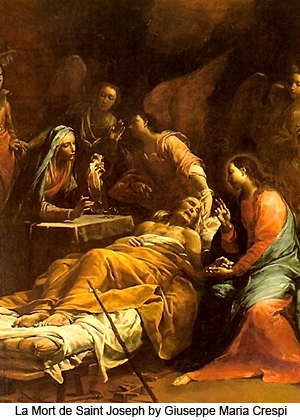 126:2.2 Just at the time when prospects were good and the future looked bright, an apparently cruel hand struck down the head of this Nazareth household, the affairs of this home were disrupted, and every plan for Jesus and his future education was demolished. This carpenter lad, now just past fourteen years of age, awakened to the realization that he had not only to fulfill the commission of his heavenly Father to reveal the divine nature on earth and in the flesh, but that his young human nature must also shoulder the responsibility of caring for his widowed mother and seven brothers and sisters —and another yet to be born. This lad of Nazareth now became the sole support and comfort of this so suddenly bereaved family. Thus were permitted those occurrences of the natural order of events on Urantia which would force this young man of destiny so early to assume these heavy but highly educational and disciplinary responsibilities attendant upon becoming the head of a human family, of becoming father to his own brothers and sisters, of supporting and protecting his mother, of functioning as guardian of his father's home, the only home he was to know while on this world.
126:2.2 Just at the time when prospects were good and the future looked bright, an apparently cruel hand struck down the head of this Nazareth household, the affairs of this home were disrupted, and every plan for Jesus and his future education was demolished. This carpenter lad, now just past fourteen years of age, awakened to the realization that he had not only to fulfill the commission of his heavenly Father to reveal the divine nature on earth and in the flesh, but that his young human nature must also shoulder the responsibility of caring for his widowed mother and seven brothers and sisters —and another yet to be born. This lad of Nazareth now became the sole support and comfort of this so suddenly bereaved family. Thus were permitted those occurrences of the natural order of events on Urantia which would force this young man of destiny so early to assume these heavy but highly educational and disciplinary responsibilities attendant upon becoming the head of a human family, of becoming father to his own brothers and sisters, of supporting and protecting his mother, of functioning as guardian of his father's home, the only home he was to know while on this world.
126:2.3 Jesus cheerfully accepted the responsibilities so suddenly thrust upon him, and he carried them faithfully to the end. At least one great problem and anticipated difficulty in his life had been tragically solved—he would not now be expected to go to Jerusalem to study under the rabbis. It remained always true that Jesus "sat at no man's feet." He was ever willing to learn from even the humblest of little children, but he never derived authority to teach truth from human sources.
126:2.4 Still he knew nothing of the Gabriel visit to his mother before his birth; he only learned of this from John on the day of his baptism, at the beginning of his public ministry.
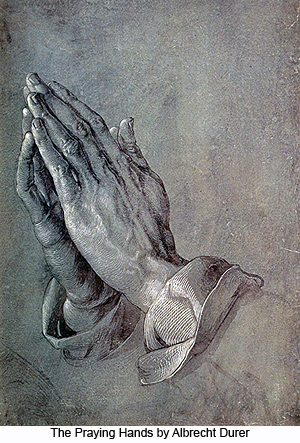 Jesus Formulates "The Lord's Prayer"
Jesus Formulates "The Lord's Prayer"
126:3.3 During this year Jesus first formulated the prayer which he subsequently taught to his apostles, and which to many has become known as "The Lord's Prayer." In a way it was an evolution of the family altar; they had many forms of praise and several formal prayers. After his father's death Jesus tried to teach the older children to express themselves individually in prayer—much as he so enjoyed doing—but they could not grasp his thought and would invariably fall back upon their memorized prayer forms. It was in this effort to stimulate his older brothers and sisters to say individual prayers that Jesus would endeavor to lead them along by suggestive phrases, and presently, without intention on his part, it developed that they were all using a form of prayer which was largely built up from these suggestive lines which Jesus had taught them.
126:3.4 At last Jesus gave up the idea of having each member of the family formulate spontaneous prayers, and one evening in October he sat down by the little squat lamp on the low stone table, and, on a piece of smooth cedar board about eighteen inches square, with a piece of charcoal he wrote out the prayer which became from that time on the standard family petition.
Jesus Ponders His Mission - The "Son Of Man"
126:3.5 This year Jesus was much troubled with confused thinking. Family responsibility had quite effectively removed all thought of immediately carrying out any plan for responding to the Jerusalem visitation directing him to "be about his Father's business." Jesus rightly reasoned that the watchcare of his earthly father's family must take precedence of all duties; that the support of his family must become his first obligation.
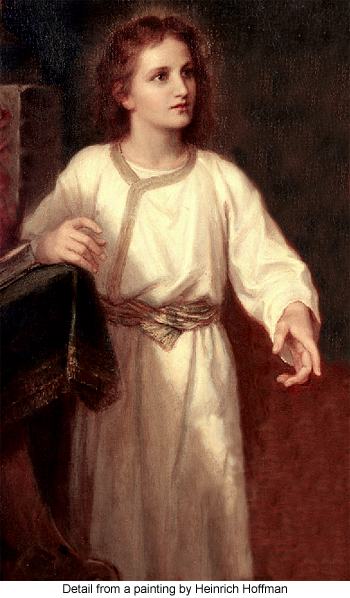 126:3.6 In the course of this year Jesus found a passage in the so-called Book of Enoch which influenced him in the later adoption of the term "Son of Man" as a designation for his bestowal mission on Urantia. He had thoroughly considered the idea of the Jewish Messiah and was firmly convinced that he was not to be that Messiah. He longed to help his father's people, but he never expected to lead Jewish armies in overthrowing the foreign domination of Palestine. He knew he would never sit on the throne of David at Jerusalem. Neither did he believe that his mission was that of a spiritual deliverer or moral teacher solely to the Jewish people. In no sense, therefore, could his life mission be the fulfillment of the intense longings and supposed Messianic prophecies of the Hebrew scriptures; at least, not as the Jews understood these predictions of the prophets. Likewise he was certain he was never to appear as the Son of Man depicted by the Prophet Daniel.
126:3.6 In the course of this year Jesus found a passage in the so-called Book of Enoch which influenced him in the later adoption of the term "Son of Man" as a designation for his bestowal mission on Urantia. He had thoroughly considered the idea of the Jewish Messiah and was firmly convinced that he was not to be that Messiah. He longed to help his father's people, but he never expected to lead Jewish armies in overthrowing the foreign domination of Palestine. He knew he would never sit on the throne of David at Jerusalem. Neither did he believe that his mission was that of a spiritual deliverer or moral teacher solely to the Jewish people. In no sense, therefore, could his life mission be the fulfillment of the intense longings and supposed Messianic prophecies of the Hebrew scriptures; at least, not as the Jews understood these predictions of the prophets. Likewise he was certain he was never to appear as the Son of Man depicted by the Prophet Daniel.
126:3.7 But when the time came for him to go forth as a world teacher, what would he call himself? What claim should he make concerning his mission? By what name would he be called by the people who would become believers in his teachings?
126:3.8 While turning all these problems over in his mind, he found in the synagogue library at Nazareth, among the apocalyptic books which he had been studying, this manuscript called "The Book of Enoch"; and though he was certain that it had not been written by Enoch of old, it proved very intriguing to him, and he read and reread it many times. There was one passage which particularly impressed him, a passage in which this term "Son of Man" appeared. The writer of this so-called Book of Enoch went on to tell about this Son of Man, describing the work he would do on earth and explaining that this Son of Man, before coming down on this earth to bring salvation to mankind, had walked through the courts of heavenly glory with his Father, the Father of all; and that he had turned his back upon all this grandeur and glory to come down on earth to proclaim salvation to needy mortals. As Jesus would read these passages (well understanding that much of the Eastern mysticism which had become admixed with these teachings was erroneous), he responded in his heart and recognized in his mind that of all the Messianic predictions of the Hebrew scriptures and of all the theories about the Jewish deliverer, none was so near the truth as this story tucked away in this only partially accredited Book of Enoch; and he then and there decided to adopt as his inaugural title "the Son of Man." And this he did when he subsequently began his public work. Jesus had an unerring ability for the recognition of truth, and truth he never hesitated to embrace, no matter from what source it appeared to emanate.
126:3.9 By this time he had quite thoroughly settled many things about his forthcoming work for the world, but he said nothing of these matters to his mother, who still held stoutly to the idea of his being the Jewish Messiah.
126:3.10 The great confusion of Jesus' younger days now arose. Having settled something about the nature of his mission on earth, "to be about his Father's business"—to show forth his Father's loving nature to all mankind—he began to ponder anew the many statements in the Scriptures referring to the coming of a national deliverer, a Jewish teacher or king. To what event did these prophecies refer? Was not he a Jew? or was he? Was he or was he not of the house of David? His mother averred he was; his father had ruled that he was not. He decided he was not. But had the prophets confused the nature and mission of the Messiah?
126:3.11 After all, could it be possible that his mother was right? In most matters, when differences of opinion had arisen in the past, she had been right. If he were a new teacher and not the Messiah, then how should he recognize the Jewish Messiah if such a one should appear in Jerusalem during the time of his earth mission; and, further, what should be his relation to this Jewish Messiah? And what should be his relation, after embarking on his life mission, to his family? to the Jewish commonwealth and religion? to the Roman Empire? to the gentiles and their religions? Each of these momentous problems this young Galilean turned over in his mind and seriously pondered while he continued to work at the carpenter's bench, laboriously making a living for himself, his mother, and eight other hungry mouths.
126:3.13 His profound periods of meditation, his frequent journeys to the hilltop for prayer, and the many strange ideas which Jesus advanced from time to time, thoroughly alarmed his mother. Sometimes she thought the lad was beside himself, and then she would steady her fears, remembering that he was, after all, a child of promise and in some manner different from other youths.
126:3.14 But Jesus was learning not to speak of all his thoughts, not to present all his ideas to the world, not even to his own mother. From this year on, Jesus' disclosures about what was going on in his mind steadily diminished; that is, he talked less about those things which an average person could not grasp, and which would lead to his being regarded as peculiar or different from ordinary folks. To all appearances he became commonplace and conventional, though he did long for someone who could understand his problems. He craved a trustworthy and confidential friend, but his problems were too complex for his human associates to comprehend. The uniqueness of the unusual situation compelled him to bear his burdens alone.
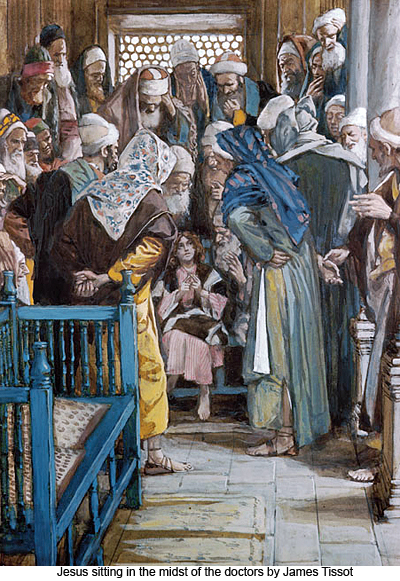 Jesus' First Sermon In The Synagogue (Age 15)
Jesus' First Sermon In The Synagogue (Age 15)
126:4.1 With the coming of his fifteenth birthday, Jesus could officially occupy the synagogue pulpit on the Sabbath day. Many times before, in the absence of speakers, Jesus had been asked to read the Scriptures, but now the day had come when, according to law, he could conduct the service. Therefore on the first Sabbath after his fifteenth birthday the chazan arranged for Jesus to conduct the morning service of the synagogue. And when all the faithful in Nazareth had assembled, the young man, having made his selection of Scriptures, stood up and began to read:
126:4.2 "The spirit of the Lord God is upon me, for the Lord has anointed me; he has sent me to bring good news to the meek, to bind up the brokenhearted, to proclaim liberty to the captives, and to set the spiritual prisoners free; to proclaim the year of God's favor and the day of our God's reckoning; to comfort all mourners, to give them beauty for ashes, the oil of joy in the place of mourning, a song of praise instead of the spirit of sorrow, that they may be called trees of righteousness, the planting of the Lord, wherewith he may be glorified.
126:4.3 "Seek good and not evil that you may live, and so the Lord, the God of hosts, shall be with you. Hate the evil and love the good; establish judgment in the gate. Perhaps the Lord God will be gracious to the remnant of Joseph.
126:4.4 "Wash yourselves, make yourselves clean; put away the evil of your doings from before my eyes; cease to do evil and learn to do good; seek justice, relieve the oppressed. Defend the fatherless and plead for the widow.
126:4.5 "Wherewith shall I come before the Lord, to bow myself before the Lord of all the earth? Shall I come before him with burnt offerings, with calves a year old? Will the Lord be pleased with thousands of rams, ten thousands of sheep, or with rivers of oil? Shall I give my first-born for my transgression, the fruit of my body for the sin of my soul? for the Lord has showed us, O men, what is good. And what does the Lord require of you but to deal justly, love mercy, and walk humbly with your God?
126:4.6 "To whom, then, will you liken God who sits upon the circle of the earth? Lift up your eyes and behold who has created all these worlds, who brings forth their host by number and calls them all by their names. He does all these things by the greatness of his might, and because he is strong in power, not one fails. He gives power to the weak, and to those who are weary he increases strength. Fear not, for I am with you; be not dismayed, for I am your God. I will strengthen you and I will help you; yes, I will uphold you with the right hand of my righteousness, for I am the Lord your God. And I will hold your right hand, saying to you, fear not, for I will help you.
126:4.7 And you are my witness, says the Lord, and my servant whom I have chosen that all may know and believe me and understand that I am the Eternal. I, even I, am the Lord, and beside me there is no savior."
126:4.8 And when he had thus read, he sat down, and the people went to their homes, pondering over the words which he had so graciously read to them. Never had his townspeople seen him so magnificently solemn; never had they heard his voice so earnest and so sincere; never had they observed him so manly and decisive, so authoritative.
126:4.9 This Sabbath afternoon Jesus climbed the Nazareth hill with James and, when they returned home, wrote out the Ten Commandments in Greek language on two smooth boards in charcoal. Subsequently Martha colored and decorated these boards, and for long they hung on the wall over James's small workbench.
The Financial Struggle At Home
126:5.1 Gradually Jesus and his family returned to the simple life of their earlier years. Their clothes and even their food became simpler. They had plenty of milk, butter, and cheese. In season they enjoyed the produce of their garden, but each passing month necessitated the practice of greater frugality. Their breakfasts were very plain; they saved their best food for the evening meal. However, among these Jews lack of wealth did not imply social inferiority.
126:5.2 Already had this youth well-nigh encompassed the comprehension of how men lived in his day. And how well he understood life in the home, field, and workshop is shown by his subsequent teachings, which so repletely reveal his intimate contact with all phases of human experience.
126:5.3 The Nazareth chazan continued to cling to the belief that Jesus was to become a great teacher, probably the successor of the renowned Gamaliel at Jerusalem.
126:5.4 Apparently all Jesus' plans for a career were thwarted. The future did not look bright as matters now developed. But he did not falter; he was not discouraged. He lived on, day by day, doing well the present duty and faithfully discharging the immediate responsibilities of his station in life. Jesus' life is the everlasting comfort of all disappointed idealists.
126:5.5 The pay of a common day-laboring carpenter was slowly diminishing. By the end of this year Jesus could earn, by working early and late, only the equivalent of about twenty-five cents a day. By the next year they found it difficult to pay the civil taxes, not to mention the synagogue assessments and the temple tax of one-half shekel. During this year the tax collector tried to squeeze extra revenue out of Jesus, even threatening to take his harp.
126:5.6 Fearing that the copy of the Greek scriptures might be discovered and confiscated by the tax collectors, Jesus, on his fifteenth birthday, presented it to the Nazareth synagogue library as his maturity offering to the Lord.
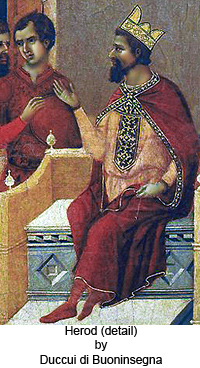 126:5.7 The great shock of his fifteenth year came when Jesus went over to Sepphoris to receive the decision of Herod regarding the appeal taken to him in the dispute about the amount of money due Joseph at the time of his accidental death. Jesus and Mary had hoped for the receipt of a considerable sum of money when the treasurer at Sepphoris had offered them a paltry amount. Joseph's brothers had taken an appeal to Herod himself, and now Jesus stood in the palace and heard Herod decree that his father had nothing due him at the time of his death. And for such an unjust decision Jesus never again trusted Herod Antipas. It is not surprising that he once alluded to Herod as "that fox."
126:5.7 The great shock of his fifteenth year came when Jesus went over to Sepphoris to receive the decision of Herod regarding the appeal taken to him in the dispute about the amount of money due Joseph at the time of his accidental death. Jesus and Mary had hoped for the receipt of a considerable sum of money when the treasurer at Sepphoris had offered them a paltry amount. Joseph's brothers had taken an appeal to Herod himself, and now Jesus stood in the palace and heard Herod decree that his father had nothing due him at the time of his death. And for such an unjust decision Jesus never again trusted Herod Antipas. It is not surprising that he once alluded to Herod as "that fox."
126:5.8 The close work at the carpenter's bench during this and subsequent years deprived Jesus of the opportunity of mingling with the caravan passengers. The family supply shop had already been taken over by his uncle, and Jesus worked altogether in the home shop, where he was near to help Mary with the family. About this time he began sending James up to the camel lot to gather information about world events, and thus he sought to keep in touch with the news of the day.
126:5.9 As he grew up to manhood, he passed through all those conflicts and confusions which the average young persons of previous and subsequent ages have undergone. And the rigorous experience of supporting his family was a sure safeguard against his having overmuch time for idle meditation or the indulgence of mystic tendencies.
Jesus, Tiller Of The Soil (Age 15)
126:5.10 This was the year that Jesus rented a considerable piece of land just to the north of their home, which was divided up as a family garden plot. Each of the older children had an individual garden, and they entered into keen competition in their agricultural efforts. Their eldest brother spent some time with them in the garden each day during the season of vegetable cultivation. As Jesus worked with his younger brothers and sisters in the garden, he many times entertained the wish that they were all located on a farm out in the country where they could enjoy the liberty and freedom of an unhampered life. But they did not find themselves growing up in the country; and Jesus, being a thoroughly practical youth as well as an idealist, intelligently and vigorously attacked his problem just as he found it, and did everything within his power to adjust himself and his family to the realities of their situation and to adapt their condition to the highest possible satisfaction of their individual and collective longings.
126:5.11 At one time Jesus faintly hoped that he might be able to gather up sufficient means, provided they could collect the considerable sum of money due his father for work on Herod's palace, to warrant undertaking the purchase of a small farm. He had really given serious thought to this plan of moving his family out into the country. But when Herod refused to pay them any of the funds due Joseph, they gave up the ambition of owning a home in the country. As it was, they contrived to enjoy much of the experience of farm life as they now had three cows, four sheep, a flock of chickens, a donkey, and a dog, in addition to the doves. Even the little tots had their regular duties to perform in the well-regulated scheme of management which characterized the home life of this Nazareth family.
126:5.12 With the close of this fifteenth year Jesus completed the traversal of that dangerous and difficult period in human existence, that time of transition between the more complacent years of childhood and the consciousness of approaching manhood with its increased responsibilities and opportunities for the acquirement of advanced experience in the development of a noble character. The growth period for mind and body had ended, and now began the real career of this young man of Nazareth.
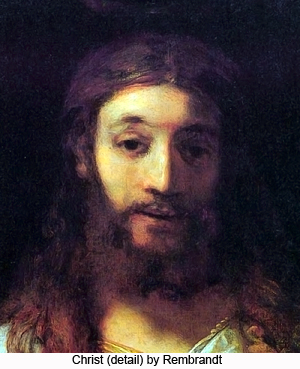 The Head Of Household (Age 16)
The Head Of Household (Age 16)
AS JESUS entered upon his adolescent years, he found himself the head and sole support of a large family. Within a few years after his father's death all their property was gone. As time passed, he became increasingly conscious of his pre-existence; at the same time he began more fully to realize that he was present on earth and in the flesh for the express purpose of revealing his Paradise Father to the children of men.
127:0.2 No adolescent youth who has lived or ever will live on this world or any other world has had or ever will have more weighty problems to resolve or more intricate difficulties to untangle. No youth of Urantia will ever be called upon to pass through more testing conflicts or more trying situations than Jesus himself endured during those strenuous years from fifteen to twenty.
127:0.3 Having thus tasted the actual experience of living these adolescent years on a world beset by evil and distraught by sin, the Son of Man became possessed of full knowledge about the life experience of the youth of all the realms of Nebadon, and thus forever he became the understanding refuge for the distressed and perplexed adolescents of all ages and on all worlds throughout the local universe.
127:0.4 Slowly, but certainly and by actual experience, this divine Son is earning the right to become sovereign of his universe, the unquestioned and supreme ruler of all created intelligences on all local universe worlds, the understanding refuge of the beings of all ages and of all degrees of personal endowment and experience.
127:1.5 This year Simon started to school, and they were compelled to sell another house. James now took charge of the teaching of his three sisters, two of whom were old enough to begin serious study. As soon as Ruth grew up, she was taken in hand by Miriam and Martha. Ordinarily the girls of Jewish families received little education, but Jesus maintained (and his mother agreed) that girls should go to school the same as boys, and since the synagogue school would not receive them, there was nothing to do but conduct a home school especially for them.
127:1.6 Throughout this year Jesus was closely confined to the workbench. Fortunately he had plenty of work; his was of such a superior grade that he was never idle no matter how slack work might be in that region. At times he had so much to do that James would help him.
127:1.7 By the end of this year he had just about made up his mind that he would, after rearing his family and seeing them married, enter publicly upon his work as a teacher of truth and as a revealer of the heavenly Father to the world. He knew he was not to become the expected Jewish Messiah, and he concluded that it was next to useless to discuss these matters with his mother; he decided to allow her to entertain whatever ideas she might choose since all he had said in the past had made little or no impression upon her and he recalled that his father had never been able to say anything that would change her mind. From this year on he talked less and less with his mother, or anyone else, about these problems. His was such a peculiar mission that no one living on earth could give him advice concerning its prosecution.
127:1.8 He was a real though youthful father to the family; he spent every possible hour with the youngsters, and they truly loved him. His mother grieved to see him work so hard; she sorrowed that he was day by day toiling at the carpenter's bench earning a living for the family instead of being, as they had so fondly planned, at Jerusalem studying with the rabbis. While there was much about her son that Mary could not understand, she did love him, and she most thoroughly appreciated the willing manner in which he shouldered the responsibility of the home.
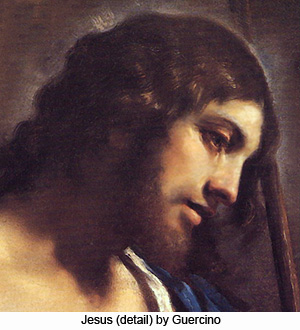 Jesus Shuns The Political Arena (Age 17)
Jesus Shuns The Political Arena (Age 17)
127:2.1 At about this time there was considerable agitation, especially at Jerusalem and in Judea, in favor of rebellion against the payment of taxes to Rome. There was coming into existence a strong nationalist party, presently to be called the Zealots. The Zealots, unlike the Pharisees, were not willing to await the coming of the Messiah. They proposed to bring things to a head through political revolt.
127:2.2 A group of organizers from Jerusalem arrived in Galilee and were making good headway until they reached Nazareth. When they came to see Jesus, he listened carefully to them and asked many questions but refused to join the party. He declined fully to disclose his reasons for not enlisting, and his refusal had the effect of keeping out many of his youthful fellows in Nazareth.
127:2.3 Mary did her best to induce him to enlist, but she could not budge him. She went so far as to intimate that his refusal to espouse the nationalist cause at her behest was insubordination, a violation of his pledge made upon their return from Jerusalem that he would be subject to his parents; but in answer to this insinuation he only laid a kindly hand on her shoulder and, looking into her face, said: "My mother, how could you?" And Mary withdrew her statement.
127:2.4 One of Jesus' uncles (Mary's brother Simon) had already joined this group, subsequently becoming an officer in the Galilean division. And for several years there was something of an estrangement between Jesus and his uncle.
127:2.5 But trouble began to brew in Nazareth. Jesus' attitude in these matters had resulted in creating a division among the Jewish youths of the city. About half had joined the nationalist organization, and the other half began the formation of an opposing group of more moderate patriots, expecting Jesus to assume the leadership. They were amazed when he refused the honor offered him, pleading as an excuse his heavy family responsibilities, which they all allowed. But the situation was still further complicated when, presently, a wealthy Jew, Isaac, a moneylender to the gentiles, came forward agreeing to support Jesus' family if he would lay down his tools and assume leadership of these Nazareth patriots.
127:2.6 Jesus, then scarcely seventeen years of age, was confronted with one of the most delicate and difficult situations of his early life. Patriotic issues, especially when complicated by tax-gathering foreign oppressors, are always difficult for spiritual leaders to relate themselves to, and it was doubly so in this case since the Jewish religion was involved in all this agitation against Rome.
127:2.7 Jesus' position was made more difficult because his mother and uncle, and even his younger brother James, all urged him to join the nationalist cause. All the better Jews of Nazareth had enlisted, and those young men who had not joined the movement would all enlist the moment Jesus changed his mind. He had but one wise counselor in all Nazareth, his old teacher, the chazan, who counseled him about his reply to the citizens' committee of Nazareth when they came to ask for his answer to the public appeal which had been made. In all Jesus' young life this was the very first time he had consciously resorted to public strategy. Theretofore, always had he depended upon a frank statement of truth to clarify the situation, but now he could not declare the full truth. He could not intimate that he was more than a man; he could not disclose his idea of the mission which awaited his attainment of a riper manhood. Despite these limitations his religious fealty and national loyalty were directly challenged. His family was in a turmoil, his youthful friends in division, and the entire Jewish contingent of the town in a hubbub. And to think that he was to blame for it all! And how innocent he had been of all intention to make trouble of any kind, much less a disturbance of this sort.
127:2.8 Something had to be done. He must state his position, and this he did bravely and diplomatically to the satisfaction of many, but not all. He adhered to the terms of his original plea, maintaining that his first duty was to his family, that a widowed mother and eight brothers and sisters needed something more than mere money could buy—the physical necessities of life—that they were entitled to a father's watchcare and guidance, and that he could not in clear conscience release himself from the obligation which a cruel accident had thrust upon him. He paid compliment to his mother and eldest brother for being willing to release him but reiterated that loyalty to a dead father forbade his leaving the family no matter how much money was forthcoming for their material support, making his never-to-be-forgotten statement that "money cannot love." In the course of this address Jesus made several veiled references to his "life mission" but explained that, regardless of whether or not it might be inconsistent with the military idea, it, along with everything else in his life, had been given up in order that he might be able to discharge faithfully his obligation to his family. Everyone in Nazareth well knew he was a good father to his family, and this was a matter so near the heart of every noble Jew that Jesus' plea found an appreciative response in the hearts of many of his hearers; and some of those who were not thus minded were disarmed by a speech made by James, which, while not on the program, was delivered at this time. That very day the chazan had rehearsed James in his speech, but that was their secret.
127:2.9 James stated that he was sure Jesus would help to liberate his people if he (James) were only old enough to assume responsibility for the family, and that, if they would only consent to allow Jesus to remain "with us, to be our father and teacher, then you will have not just one leader from Joseph's family, but presently you will have five loyal nationalists, for are there not five of us boys to grow up and come forth from our brother-father's guidance to serve our nation?" And thus did the lad bring to a fairly happy ending a very tense and threatening situation.
127:2.10 The crisis for the time being was over, but never was this incident forgotten in Nazareth. The agitation persisted; not again was Jesus in universal favor; the division of sentiment was never fully overcome. And this, augmented by other and subsequent occurrences, was one of the chief reasons why he moved to Capernaum in later years. Henceforth Nazareth maintained a division of sentiment regarding the Son of Man.
Jesus And James Travel To Jerusalem
127:3.1 In the course of this year all the family property, except the home and garden, was disposed of. The last piece of Capernaum property (except an equity in one other), already mortgaged, was sold. The proceeds were used for taxes, to buy some new tools for James, and to make a payment on the old family supply and repair shop near the caravan lot, which Jesus now proposed to buy back since James was old enough to work at the house shop and help Mary about the home. With the financial pressure thus eased for the time being, Jesus decided to take James to the Passover. They went up to Jerusalem a day early, to be alone, going by way of Samaria. They walked, and Jesus told James about the historic places en route as his father had taught him on a similar journey five years before.
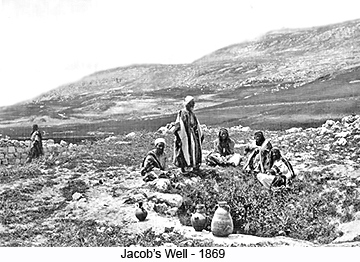 127:3.2 In passing through Samaria, they saw many strange sights. On this journey they talked over many of their problems, personal, family, and national. James was a very religious type of lad, and while he did not fully agree with his mother regarding the little he knew of the plans concerning Jesus' lifework, he did look forward to the time when he would be able to assume responsibility for the family so that Jesus could begin his mission. He was very appreciative of Jesus' taking him up to the Passover, and they talked over the future more fully than ever before.
127:3.2 In passing through Samaria, they saw many strange sights. On this journey they talked over many of their problems, personal, family, and national. James was a very religious type of lad, and while he did not fully agree with his mother regarding the little he knew of the plans concerning Jesus' lifework, he did look forward to the time when he would be able to assume responsibility for the family so that Jesus could begin his mission. He was very appreciative of Jesus' taking him up to the Passover, and they talked over the future more fully than ever before.
127:3.3 Jesus did much thinking as they journeyed through Samaria, particularly at Bethel and when drinking from Jacob's Well. He and his brother discussed the traditions of Abraham, Isaac, and Jacob. He did much to prepare James for what he was about to witness at Jerusalem, thus seeking to lessen the shock such as he himself had experienced on his first visit to the temple. But James was not so sensitive to some of these sights. He commented on the perfunctory and heartless manner in which some of the priests performed their duties but on the whole greatly enjoyed his sojourn at Jerusalem.
127:3.4 Jesus took James to Bethany for the Passover supper. Simon had been laid to rest with his fathers, and Jesus presided over this household as the head of the Passover family, having brought the paschal lamb from the temple.
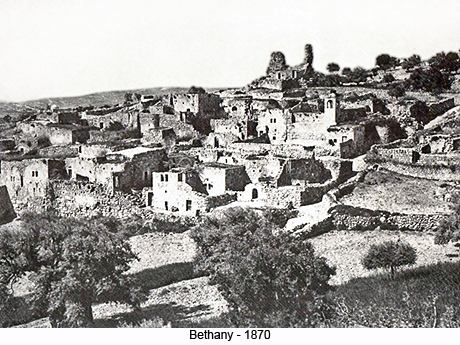 127:3.5 After the Passover supper Mary sat down to talk with James while Martha, Lazarus, and Jesus talked together far into the night. The next day they attended the temple services, and James was received into the commonwealth of Israel. That morning, as they paused on the brow of Olivet to view the temple, while James exclaimed in wonder, Jesus gazed on Jerusalem in silence. James could not comprehend his brother's demeanor. That night they again returned to Bethany and would have departed for home the next day, but James was insistent on their going back to visit the temple, explaining that he wanted to hear the teachers. And while this was true, secretly in his heart he wanted to hear Jesus participate in the discussions, as he had heard his mother tell about. Accordingly, they went to the temple and heard the discussions, but Jesus asked no questions. It all seemed so puerile and insignificant to this awakening mind of man and God—he could only pity them. James was disappointed that Jesus said nothing. To his inquiries Jesus only made reply, "My hour has not yet come."
127:3.5 After the Passover supper Mary sat down to talk with James while Martha, Lazarus, and Jesus talked together far into the night. The next day they attended the temple services, and James was received into the commonwealth of Israel. That morning, as they paused on the brow of Olivet to view the temple, while James exclaimed in wonder, Jesus gazed on Jerusalem in silence. James could not comprehend his brother's demeanor. That night they again returned to Bethany and would have departed for home the next day, but James was insistent on their going back to visit the temple, explaining that he wanted to hear the teachers. And while this was true, secretly in his heart he wanted to hear Jesus participate in the discussions, as he had heard his mother tell about. Accordingly, they went to the temple and heard the discussions, but Jesus asked no questions. It all seemed so puerile and insignificant to this awakening mind of man and God—he could only pity them. James was disappointed that Jesus said nothing. To his inquiries Jesus only made reply, "My hour has not yet come."
127:3.6 The next day they journeyed home by Jericho and the Jordan valley, and Jesus recounted many things by the way, including his former trip over this road when he was thirteen years old.
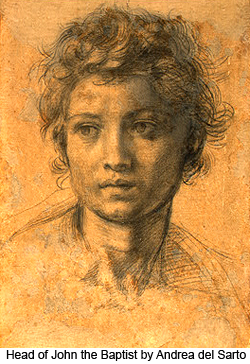 Jesus And John Meet Once More (Age 18)
Jesus And John Meet Once More (Age 18)
127:3.11 In September, Elizabeth and John came to visit the Nazareth family. John, having lost his father, intended to return to the Judean hills to engage in agriculture and sheep raising unless Jesus advised him to remain in Nazareth to take up carpentry or some other line of work. They did not know that the Nazareth family was practically penniless. The more Mary and Elizabeth talked about their sons, the more they became convinced that it would be good for the two young men to work together and see more of each other.
127:3.12 Jesus and John had many talks together; and they talked over some very intimate and personal matters. When they had finished this visit, they decided not again to see each other until they should meet in their public service after "the heavenly Father should call" them to their work. John was tremendously impressed by what he saw at Nazareth that he should return home and labor for the support of his mother. He became convinced that he was to be a part of Jesus' life mission, but he saw that Jesus was to occupy many years with the rearing of his family; so he was much more content to return to his home and settle down to the care of their little farm and to minister to the needs of his mother. And never again did John and Jesus see each other until that day by the Jordan when the Son of Man presented himself for baptism.
 Another Tragedy On Top Of Poverty
Another Tragedy On Top Of Poverty
127:3.13 On Saturday afternoon, December 3, of this year, death for the second time struck at this Nazareth family. Little Amos, their baby brother, died after a week's illness with a high fever. After passing through this time of sorrow with her first-born son as her only support, Mary at last and in the fullest sense recognized Jesus as the real head of the family; and he was truly a worthy head.
127:3.14 For four years their standard of living had steadily declined; year by year they felt the pinch of increasing poverty. By the close of this year they faced one of the most difficult experiences of all their uphill struggles. James had not yet begun to earn much, and the expenses of a funeral on top of everything else staggered them. But Jesus would only say to his anxious and grieving mother: "Mother-Mary, sorrow will not help us; we are all doing our best, and mother's smile, perchance, might even inspire us to do better. Day by day we are strengthened for these tasks by our hope of better days ahead." His sturdy and practical optimism was truly contagious; all the children lived in an atmosphere of anticipation of better times and better things. And this hopeful courage contributed mightily to the development of strong and noble characters, in spite of the depressiveness of their poverty.
127:3.15 Jesus possessed the ability effectively to mobilize all his powers of mind, soul, and body on the task immediately in hand. He could concentrate his deep-thinking mind on the one problem which he wished to solve, and this, in connection with his untiring patience, enabled him serenely to endure the trials of a difficult mortal existence—to live as if he were "seeing Him who is invisible."
 Family Matters
Family Matters
127:4.1 By this time Jesus and Mary were getting along much better. She regarded him less as a son; he had become to her more a father to her children. Each day's life swarmed with practical and immediate difficulties. Less frequently they spoke of his lifework, for, as time passed, all their thought was mutually devoted to the support and upbringing of their family of four boys and three girls.
127:4.2 By the beginning of this year Jesus had fully won his mother to the acceptance of his methods of child training—the positive injunction to do good in the place of the older Jewish method of forbidding to do evil. In his home and throughout his public-teaching career Jesus invariably employed the positive form of exhortation. Always and everywhere did he say, "You shall do this—you ought to do that." Never did he employ the negative mode of teaching derived from the ancient taboos. He refrained from placing emphasis on evil by forbidding it, while he exalted the good by commanding its performance. Prayer time in this household was the occasion for discussing anything and everything relating to the welfare of the family.
127:4.3 Jesus began wise discipline upon his brothers and sisters at such an early age that little or no punishment was ever required to secure their prompt and wholehearted obedience. The only exception was Jude, upon whom on sundry occasions Jesus found it necessary to impose penalties for his infractions of the rules of the home. On three occasions when it was deemed wise to punish Jude for self-confessed and deliberate violations of the family rules of conduct, his punishment was fixed by the unanimous decree of the older children and was assented to by Jude himself before it was inflicted.
127:4.4 While Jesus was most methodical and systematic in everything he did, there was also in all his administrative rulings a refreshing elasticity of interpretation and an individuality of adaptation that greatly impressed all the children with the spirit of justice which actuated their father-brother. He never arbitrarily disciplined his brothers and sisters, and such uniform fairness and personal consideration greatly endeared Jesus to all his family.
127:4.5 James and Simon grew up trying to follow Jesus' plan of placating their bellicose and sometimes irate playmates by persuasion and nonresistance, and they were fairly successful; but Joseph and Jude, while assenting to such teachings at home, made haste to defend themselves when assailed by their comrades; in particular was Jude guilty of violating the spirit of these teachings. But nonresistance was not a rule of the family. No penalty was attached to the violation of personal teachings.
127:4.6 In general, all of the children, particularly the girls, would consult Jesus about their childhood troubles and confide in him just as they would have in an affectionate father.
127:4.7 James was growing up to be a well-balanced and even-tempered youth, but he was not so spiritually inclined as Jesus. He was a much better student than Joseph, who, while a faithful worker, was even less spiritually minded. Joseph was a plodder and not up to the intellectual level of the other children. Simon was a well-meaning boy but too much of a dreamer. He was slow in getting settled down in life and was the cause of considerable anxiety to Jesus and Mary. But he was always a good and well-intentioned lad. Jude was a firebrand. He had the highest of ideals, but he was unstable in temperament. He had all and more of his mother's determination and aggressiveness, but he lacked much of her sense of proportion and discretion.
127:4.8 Miriam was a well-balanced and level-headed daughter with a keen appreciation of things noble and spiritual. Martha was slow in thought and action but a very dependable and efficient child. Baby Ruth was the sunshine of the home; though thoughtless of speech, she was most sincere of heart. She just about worshiped her big brother and father. But they did not spoil her. She was a beautiful child but not quite so comely as Miriam, who was the belle of the family, if not of the city.
127:4.9 As time passed, Jesus did much to liberalize and modify the family teachings and practices related to Sabbath observance and many other phases of religion, and to all these changes Mary gave hearty assent. By this time Jesus had become the unquestioned head of the house.
127:4.10 This year Jude started to school, and it was necessary for Jesus to sell his harp in order to defray these expenses. Thus disappeared the last of his recreational pleasures. He much loved to play the harp when tired in mind and weary in body, but he comforted himself with the thought that at least the harp was safe from seizure by the tax collector.
Rebecca Falls In Love With Jesus (Age 19)
127:5.1 Although Jesus was poor, his social standing in Nazareth was in no way impaired. He was one of the foremost young men of the city and very highly regarded by most of the young women. Since Jesus was such a splendid specimen of robust and intellectual manhood, and considering his reputation as a spiritual leader, it was not strange that Rebecca, the eldest daughter of Ezra, a wealthy merchant and trader of Nazareth, should discover that she was slowly falling in love with this son of Joseph. She first confided her affection to Miriam, Jesus' sister, and Miriam in turn talked all this over with her mother. Mary was intensely aroused. Was she about to lose her son, now become the indispensable head of the family? Would troubles never cease? What next could happen? And then she paused to contemplate what effect marriage would have upon Jesus' future career; not often, but at least sometimes, did she recall the fact that Jesus was a "child of promise." After she and Miriam had talked this matter over, they decided to make an effort to stop it before Jesus learned about it, by going direct to Rebecca, laying the whole story before her, and honestly telling her about their belief that Jesus was a son of destiny; that he was to become a great religious leader, perhaps the Messiah.
127:5.2 Rebecca listened intently; she was thrilled with the recital and more than ever determined to cast her lot with this man of her choice and to share his career of leadership. She argued (to herself) that such a man would all the more need a faithful and efficient wife. She interpreted Mary's efforts to dissuade her as a natural reaction to the dread of losing the head and sole support of her family; but knowing that her father approved of her attraction for the carpenter's son, she rightly reckoned that he would gladly supply the family with sufficient income fully to compensate for the loss of Jesus' earnings. When her father agreed to such a plan, Rebecca had further conferences with Mary and Miriam, and when she failed to win their support, she made bold to go directly to Jesus. This she did with the co-operation of her father, who invited Jesus to their home for the celebration of Rebecca's seventeenth birthday.
 127:5.3 Jesus listened attentively and sympathetically to the recital of these things, first by the father, then by Rebecca herself. He made kindly reply to the effect that no amount of money could take the place of his obligation personally to rear his father's family, to "fulfill the most sacred of all human trusts—loyalty to one's own flesh and blood." Rebecca's father was deeply touched by Jesus' words of family devotion and retired from the conference. His only remark to Mary, his wife, was: "We can't have him for a son; he is too noble for us."
127:5.3 Jesus listened attentively and sympathetically to the recital of these things, first by the father, then by Rebecca herself. He made kindly reply to the effect that no amount of money could take the place of his obligation personally to rear his father's family, to "fulfill the most sacred of all human trusts—loyalty to one's own flesh and blood." Rebecca's father was deeply touched by Jesus' words of family devotion and retired from the conference. His only remark to Mary, his wife, was: "We can't have him for a son; he is too noble for us."
127:5.4 Then began that eventful talk with Rebecca. Thus far in his life, Jesus had made little distinction in his association with boys and girls, with young men and young women. His mind had been altogether too much occupied with the pressing problems of practical earthly affairs and the intriguing contemplation of his eventual career "about his Father's business" ever to have given serious consideration to the consummation of personal love in human marriage. But now he was face to face with another of those problems which every average human being must confront and decide. Indeed was he "tested in all points like as you are."
127:5.5 After listening attentively, he sincerely thanked Rebecca for her expressed admiration, adding, "it shall cheer and comfort me all the days of my life." He explained that he was not free to enter into relations with any woman other than those of simple brotherly regard and pure friendship. He made it clear that his first and paramount duty was the rearing of his father's family, that he could not consider marriage until that was accomplished; and then he added: "If I am a son of destiny, I must not assume obligations of lifelong duration until such a time as my destiny shall be made manifest."
127:5.6 Rebecca was heartbroken. She refused to be comforted and importuned her father to leave Nazareth until he finally consented to move to Sepphoris. In after years, to the many men who sought her hand in marriage, Rebecca had but one answer. She lived for only one purpose—to await the hour when this, to her, the greatest man who ever lived would begin his career as a teacher of living truth. And she followed him devotedly through his eventful years of public labor, being present (unobserved by Jesus) that day when he rode triumphantly into Jerusalem; and she stood "among the other women" by the side of Mary on that fateful and tragic afternoon when the Son of Man hung upon the cross, to her, as well as to countless worlds on high, "the one altogether lovely and the greatest among ten thousand."
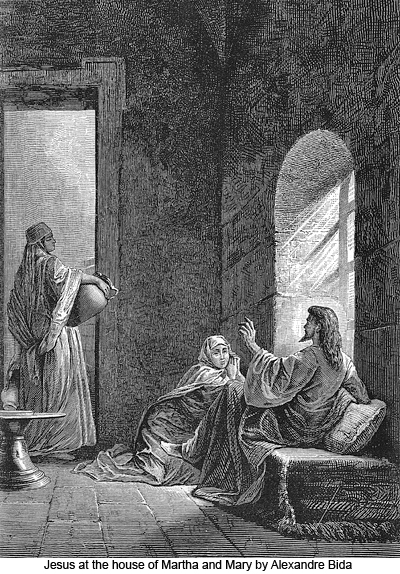 The First "Bloodless" Passover With The Zebedees (Age 20)
The First "Bloodless" Passover With The Zebedees (Age 20)
127:6.3 Although they could hardly afford it, Jesus had a strange longing to go up to Jerusalem for the Passover. His mother, knowing of his recent experience with Rebecca, wisely urged him to make the journey. He was not markedly conscious of it, but what he most wanted was an opportunity to talk with Lazarus and to visit with Martha and Mary. Next to his own family he loved these three most of all.
127:6.4 In making this trip to Jerusalem, he went by way of Megiddo, Antipatris, and Lydda, in part covering the same route traversed when he was brought back to Nazareth on the return from Egypt. He spent four days going up to the Passover and thought much about the past events which had transpired in and around Megiddo, the international battlefield of Palestine.
127:6.5 Jesus passed on through Jerusalem, only pausing to look upon the temple and the gathering throngs of visitors. He had a strange and increasing aversion to this Herod-built temple with its politically appointed priesthood. He wanted most of all to see Lazarus, Martha, and Mary. Lazarus was the same age as Jesus and now head of the house; by the time of this visit Lazarus's mother had also been laid to rest. Martha was a little over one year older than Jesus, while Mary was two years younger. And Jesus was the idolized ideal of all three of them.
127:6.6 On this visit occurred one of those periodic outbreaks of rebellion against tradition—the expression of resentment for those ceremonial practices which Jesus deemed misrepresentative of his Father in heaven. Not knowing Jesus was coming, Lazarus had arranged to celebrate the Passover with friends in an adjoining village down the Jericho road. Jesus now proposed that they celebrate the feast where they were, at Lazarus's house. "But," said Lazarus, "we have no paschal lamb." And then Jesus entered upon a prolonged and convincing dissertation to the effect that the Father in heaven was not truly concerned with such childlike and meaningless rituals. After solemn and fervent prayer they rose, and Jesus said: "Let the childlike and darkened minds of my people serve their God as Moses directed; it is better that they do, but let us who have seen the light of life no longer approach our Father by the darkness of death. Let us be free in the knowledge of the truth of our Father's eternal love."
127:6.7 That evening about twilight these four sat down and partook of the first Passover feast ever to be celebrated by devout Jew without the paschal lamb. The unleavened bread and the wine had been made ready for this Passover, and these emblems, which Jesus termed "the bread of life" and "the water of life," he served to his companions, and they ate in solemn conformity with the teachings just imparted. It was his custom to engage in this sacramental ritual whenever he paid subsequent visits to Bethany. When he returned home, he told all this to his mother. She was shocked at first but came gradually to see his viewpoint; nevertheless, she was greatly relieved when Jesus assured her that he did not intend to introduce this new idea of the Passover in their family. At home with the children he continued, year by year, to eat the Passover "according to the law of Moses."
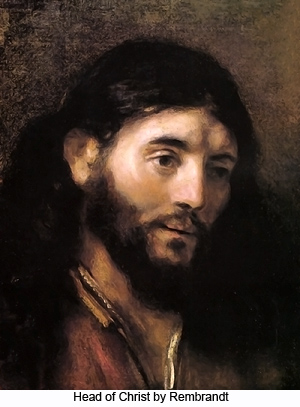 On The Threshold Of Full Manhood (Age 20)
On The Threshold Of Full Manhood (Age 20)
127:6.12 Jesus is rapidly becoming a man, not just a young man but an adult. He has learned well to bear responsibility. He knows how to carry on in the face of disappointment. He bears up bravely when his plans are thwarted and his purposes temporarily defeated. He has learned how to be fair and just even in the face of injustice. He is learning how to adjust his ideals of spiritual living to the practical demands of earthly existence. He is learning how to plan for the achievement of a higher and distant goal of idealism while he toils earnestly for the attainment of a nearer and immediate goal of necessity. He is steadily acquiring the art of adjusting his aspirations to the commonplace demands of the human occasion. He has very nearly mastered the technique of utilizing the energy of the spiritual drive to turn the mechanism of material achievement. He is slowly learning how to live the heavenly life while he continues on with the earthly existence. More and more he depends upon the ultimate guidance of his heavenly Father while he assumes the fatherly role of guiding and directing the children of his earth family. He is becoming experienced in the skillful wresting of victory from the very jaws of defeat; he is learning how to transform the difficulties of time into the triumphs of eternity.
127:6.13 And so, as the years pass, this young man of Nazareth continues to experience life as it is lived in mortal flesh on the worlds of time and space. He lives a full, representative, and replete life on Urantia. He left this world ripe in the experience which his creatures pass through during the short and strenuous years of their first life, the life in the flesh. And all this human experience is an eternal possession of the Universe Sovereign. He is our understanding brother, sympathetic friend, experienced sovereign, and merciful father.
127:6.14 As a child he accumulated a vast body of knowledge; as a youth he sorted, classified, and correlated this information; and now as a man of the realm he begins to organize these mental possessions preparatory to utilization in his subsequent teaching, ministry, and service in behalf of his fellow mortals on this world and on all other spheres of habitation throughout the entire universe of Nebadon.
127:6.15 Born into the world a babe of the realm, he has lived his childhood life and passed through the successive stages of youth and young manhood; he now stands on the threshold of full manhood, rich in the experience of human living, replete in the understanding of human nature, and full of sympathy for the frailties of human nature. He is becoming expert in the divine art of revealing his Paradise Father to all ages and stages of mortal creatures.
127:6.16 And now as a full-grown man—an adult of the realm—he prepares to continue his supreme mission of revealing God to men and leading men to God.
An Average Human Life
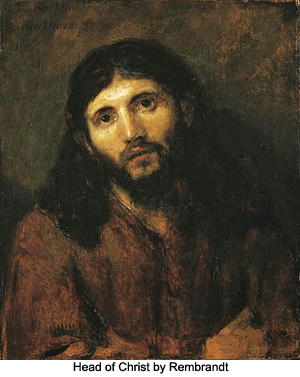 AS JESUS of Nazareth entered upon the early years of his adult life, he had lived, and continued to live, a normal and average human life on earth. Jesus came into this world just as other children come; he had nothing to do with selecting his parents. He did choose this particular world as the planet whereon to carry out his seventh and final bestowal, his incarnation in the likeness of mortal flesh, but otherwise he entered the world in a natural manner, growing up as a child of the realm and wrestling with the vicissitudes of his environment just as do other mortals on this and on similar worlds.
AS JESUS of Nazareth entered upon the early years of his adult life, he had lived, and continued to live, a normal and average human life on earth. Jesus came into this world just as other children come; he had nothing to do with selecting his parents. He did choose this particular world as the planet whereon to carry out his seventh and final bestowal, his incarnation in the likeness of mortal flesh, but otherwise he entered the world in a natural manner, growing up as a child of the realm and wrestling with the vicissitudes of his environment just as do other mortals on this and on similar worlds.


